ASUS Zenbook (UX21) Review
by Anand Lal Shimpi on October 22, 2011 8:00 PM ESTPerformance
Raw CPU performance of the Zenbook's UX21 is obviously within the realm of the 11-inch MacBook Air, however its SSD really pushes it ahead of the MacBook Air in a lot of the PCMark 7 tests. PCMark tends to emphasize the benefits of an SSD but it really does illustrate just how much of a difference an SSD can make. A lot of the faster systems we've reviewed with mechanical drives simply feel slower than the Zenbook as a result of the latter having an extremely capable SSD. If there's any impact that Ultrabooks have on the market I hope it's the more widespread use of SSDs by OEMs.
Gaming performance is not a strong suit of the Zenbook UX21. Pretty much anything with a half-way decent discrete GPU is going to put this thing to shame. While you can play some games on the Zenbook, if you're planning on doing any real gaming with your notebook you probably don't want an Ultrabook.
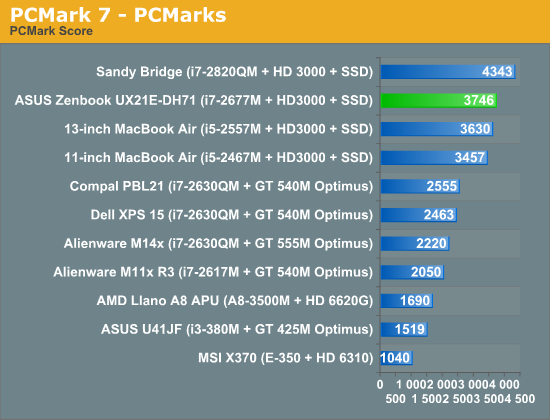
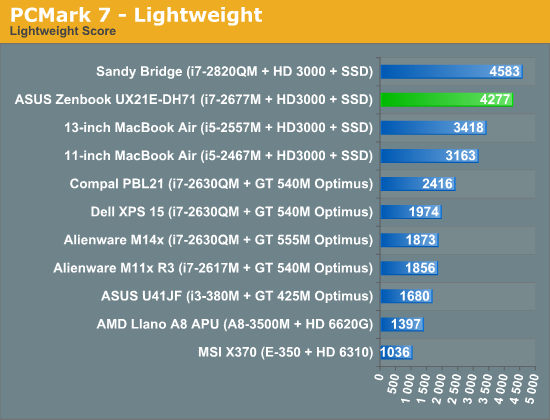
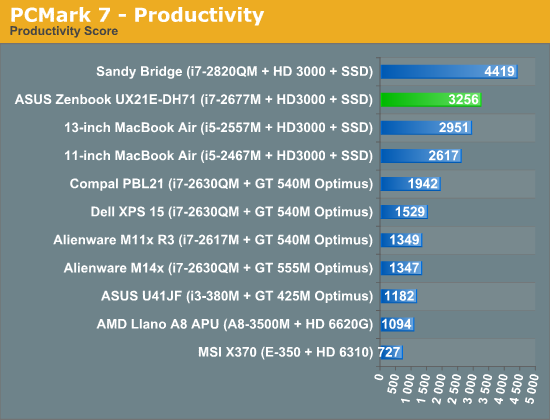
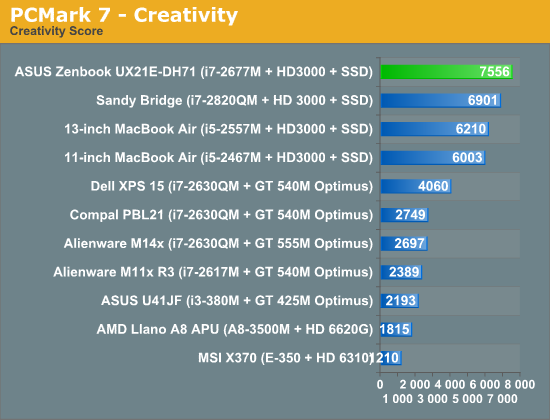
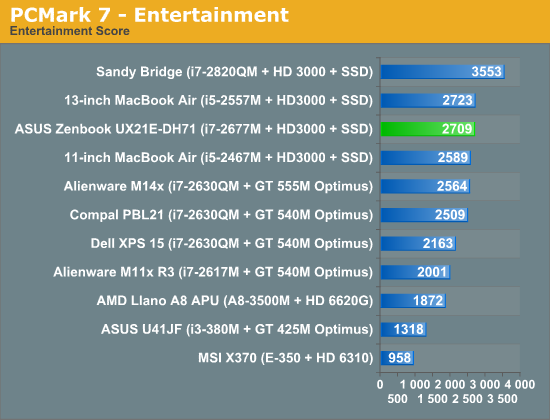
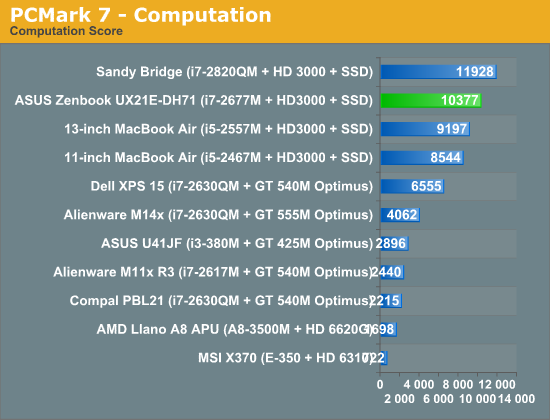
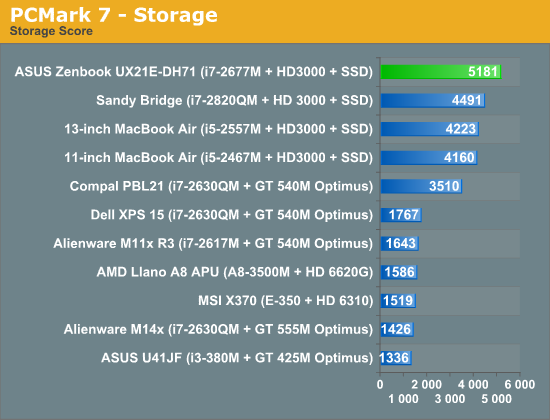
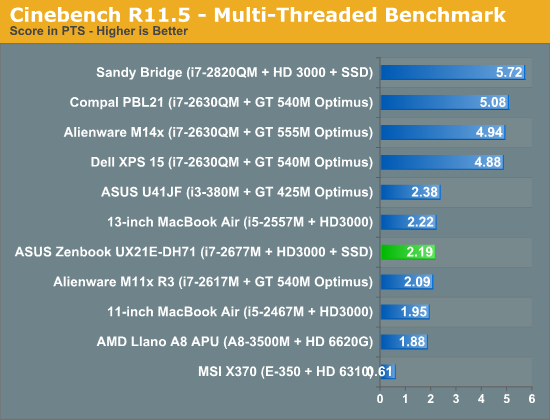
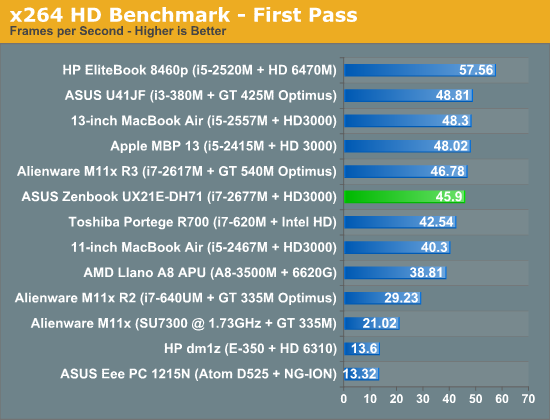
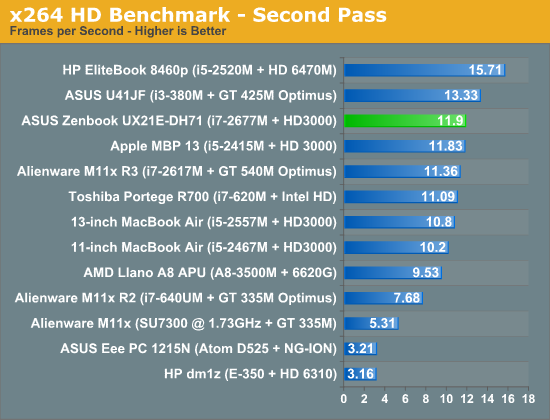
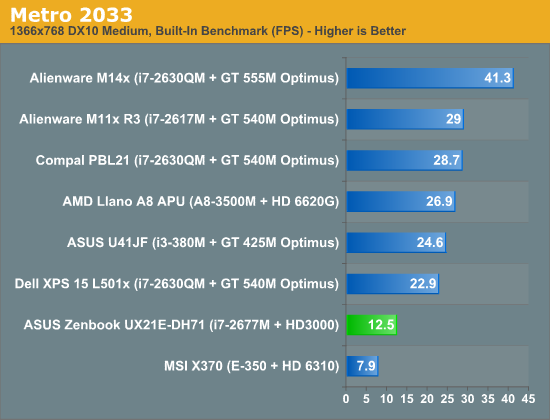
Boot and Resume Time
ASUS did a lot of BIOS optimization work to make the UX21 boot as quickly as possible. In its default configuration you don't see a POST screen; instead you get a quick flash of the ASUS logo before immediately being dumped into the Windows 7 startup sequence. The whole process from power off to desktop takes 16.7 seconds, which is actually marginally little quicker than a MacBook Air from off to OS X (17.2 seconds).
Resume time is even more impressive. By default the UX21 goes into a suspend-to-RAM state when you shut the lid. Resuming from this state takes just a hair over 2 seconds (I measured anywhere from 2.04—2.22 seconds)—it's quick. The WiFi usually takes a couple more seconds to become active beyond that, and Windows doesn't remember your previous brightness setting just whatever setting the active power plan was set to upon resume. Other than those two hiccups, the experience is just awesome.










109 Comments
View All Comments
KPOM - Sunday, October 23, 2011 - link
Nice review, as usual. The ASUS Zenbooks are the first credible competitors to the MacBook Air, in my opinion (far more than the Acer), in that they are nearly identically equipped, with some upgrades (faster SSD, better sound) at a lower price. Hopefully this pushes Apple a bit to do some upgrades for next year's Ivy Bridge MacBook Air (I wouldn't mind a better speaker and 6Gbps SSDs, and perhaps a small price drop for the upgraded models).C300fans - Monday, October 24, 2011 - link
I fail to see any lower price comparing with AIR.madmark4 - Thursday, November 3, 2011 - link
Seriously?Let me step you through it then:
1) Base MBA, $999. Slower processor, 64gb SSD, and 2gb ram.
2) Base UX21, $999. Faster processor, 128gb SSD, and 4gb ram.
Did you happen to see the lower prices there? I think most do.
sapi3n - Sunday, October 23, 2011 - link
my problem with this piece of hardware is in the interface. I've got a core 2 duo Asus laptop that is quite good, but the keyboard is like typing on a rope bridge, forcing me to carry an external keyboard for anything expansive. I wish this wonderful company would start with the keyboard, and work outward.twotwotwo - Sunday, October 23, 2011 - link
Sounds like you find the bad display contrast pretty maddening. Are you saying you'd advocate Windows users get a Macbook Air just because of it, though? It's $250 more (system cost + getting Windows Home Premium) plus the fuss of setting up Boot Camp, and folks might prefer the Zenbook for the better SSD, the resolution, the USB 3/VGA/HDMI/Ethernet connection options, etc. The Air seems like a choice for graphics-focused folks or people looking for *the* most premium ultraportable there is, but it doesn't seem like the shoo-in choice for a typical mobility-focused Windows user.But if the display *is* a total dealbreaker I'd love to hear more about why. A dull grey backlight bleed sounds annoying, but reflections from a glossy screen coating seem worse to me and reviewers seem to mostly accept the trend towards glossy displays. But I can't really do any comparisons since I don't have a Zenbook sitting around (or a ThinkPad X1, which seems to have the same contrast level), so your insight would be interesting here.
Does sound like a pity about the Asus's touchpad. :/
agent2099 - Sunday, October 23, 2011 - link
I'm disappointed with the maximum resolution for the microHDMI port. It only does 1900x1080 which means you cannot connect it ton a 24" monitor at native res (1900x1200). Is this just a limitation of the microHDMI port or for all intel HD graphics. For some of the other laptops out there that have full size HDMI, can you output 1900x1200 native?repoman27 - Monday, October 24, 2011 - link
The HD Graphics in 2nd Gen Intel Core processors support HDMI 1.4 features, one such feature being the Micro HDMI connector itself. Intel is a bit vague as to the maximum resolution using HDMI, although they clearly note that 2560x1600 is achievable using DisplayPort 1.1. It's odd that the spec here is for less than 1920x1200 since even HDMI 1.0 supported resolutions that high. Although 1920x1200 displays seem to be going the way of the dodo due to the onslaught of 1920x1080 "Full-HD" panels, it's still curious to see such a seemingly arbitrary limitation.Watwatwat - Monday, October 24, 2011 - link
if you are just using this anywhere, on your lap even, viewing angle becomes key, esp with such a small short display. they really dropped the ball going brighter instead of wider.rs2 - Monday, October 24, 2011 - link
Sorry, but you must be dreaming. Either that, or your requirements for labeling something "extremely responsive" have seriously been slipping. Extremely responsive doesn't mean "static content scrolls smoothly across the screen and looks pretty", it means more along the lines of "when I launch an app, I don't have to wait 5 to 10 seconds for it to load and become usable" and "I can switch easily and quickly between multiple applications, without losing my view of any of them if I so choose" and "my device doesn't need a full minute to power on from a cold start".Today's tablets are a world away from being "extremely responsive" by any reasonable set of criteria.
alxx - Monday, October 24, 2011 - link
So any chance of giving this a review with it running linux ?fedora 15 or ubuntu ?
Is it full bluetooth 4 support or limited ?
Does it support HS , low power and low energy or ???